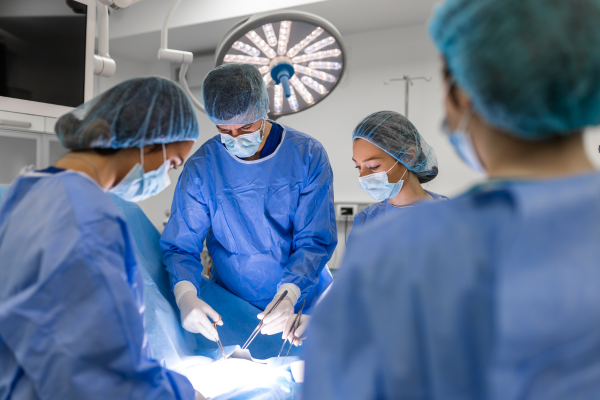Introduction of Operation Theatre
The Bachelor of Science in Operation Theatre Technology is a meticulously designed academic and professional program aimed at cultivating advanced expertise in perioperative care, surgical support, and operation theatre management. By synthesizing medical sciences with technological applications, the program addresses the growing demand for proficient professionals adept at navigating the complexities of modern surgical environments. As surgical procedures become increasingly sophisticated, this discipline plays an integral role in ensuring patient safety and enhancing procedural outcomes.

Program Structure
The B.Sc. in Operation Theatre Technology spans three years, divided into six semesters, with an option for extended internships in specialized institutions. The structure balances theoretical instruction, practical training, and clinical exposure, ensuring comprehensive preparation for professional roles. Key components include:
- First Year: Foundational courses in human anatomy, physiology, and introductory operation theatre protocols, emphasizing the integration of biological sciences with surgical applications.
- Second Year: Advanced study in pharmacology, anesthesiology, and surgical techniques, fostering an in-depth understanding of patient management and intraoperative care.
- Third Year: Focus on specialized methodologies, emergency response strategies, and research proficiency, equipping students to address complex challenges in healthcare.
Clinical rotations and supervised internships are integral, enabling students to apply their knowledge in real-world, high-pressure settings while developing their professional competencies.
Curriculum
The curriculum is structured to provide a robust blend of theoretical and practical learning, aligning with the dynamic demands of the healthcare sector. Core components include:
- Core Disciplines:
- Anatomy and Physiology: Detailed exploration of the structural and functional aspects of the human body.
- Microbiology: Study of microorganisms relevant to infection control in surgical settings.
- Pathology: Analysis of disease mechanisms with a focus on diagnostic techniques.
- Pharmacology: Comprehensive understanding of drugs, including anesthetic agents, and their clinical applications.
- Surgical Techniques: Training in preoperative preparation, intraoperative procedures, and postoperative care.
- Specialized Topics:
- Operation Theatre Management: Strategies for optimizing workflow, resource allocation, and team coordination.
- Anaesthesia Technology: Proficient handling of anaesthetic equipment and patient monitoring systems.
- Medical Jurisprudence: Understanding the ethical and legal aspects of medical practice.
- Critical Care Management: Advanced techniques for managing acute emergencies and critical scenarios.
- Biomedical Instrumentation: Technical knowledge of surgical and diagnostic equipment operation and maintenance.
- Practical Applications:
- Hands-on training in state-of-the-art simulation labs and clinical settings.
- Expertise in sterilization protocols, infection control, and surgical instrument handling.
- Exposure to diverse surgical specialties, including cardiology, neurology, orthopaedics, and gynaecology.
- Research and Scholarly Work:
- Training in research methodologies, critical analysis, and dissemination of findings.
- Capstone projects addressing contemporary challenges and innovations in surgical practices.
Competency Development
Graduates emerge as highly skilled professionals with a broad spectrum of competencies:
- Technical Expertise: Mastery of advanced surgical equipment, anesthesia systems, and operation theatre protocols.
- Analytical and Problem-Solving Skills: Capacity to address dynamic clinical challenges with innovative solutions.
- Interdisciplinary Collaboration: Effective integration into multidisciplinary healthcare teams.
- Ethical and Professional Standards: Commitment to upholding medical ethics, patient confidentiality, and legal compliance.
- Adaptability: Agility in adapting to new surgical technologies and evolving healthcare protocols.
Career Pathways
The program opens doors to diverse career opportunities in healthcare, research, and education. Graduates are well-positioned to excel in roles such as:
Key Roles:
- Senior Operation Theatre Technologist
- Chief Surgical Technologist
- Advanced Anaesthesia Practitioner
- Clinical Operations Manager
- Biomedical Equipment Specialist
- Emergency Response Coordinator
- Academic Researcher and Educator
Professional Spheres:
- Advanced surgical units in tertiary hospitals
- Trauma and critical care centers
- Biomedical research facilities
- Global health organizations
- Academic and training institutions
- Regulatory agencies overseeing healthcare standards
With experience, professionals can advance to leadership roles, driving innovation in surgical care delivery and shaping healthcare policies.
Conclusion
The Bachelor of Science in Operation Theatre Technology offers an unparalleled academic journey, combining rigorous training with practical expertise. Graduates are equipped to navigate the complexities of contemporary surgical practices, contribute meaningfully to multidisciplinary teams, and drive advancements in the healthcare sector. As the interface between medicine and technology continues to evolve, professionals in this field are poised to make significant contributions to patient care and operational excellence, solidifying their role as indispensable assets in the global healthcare system.
THANK YOU

